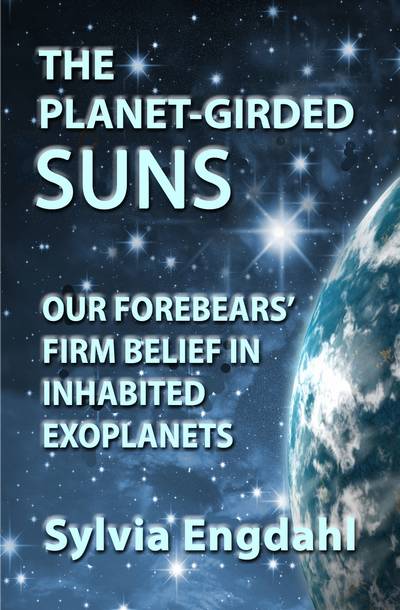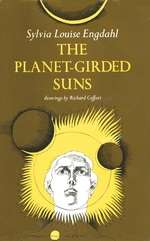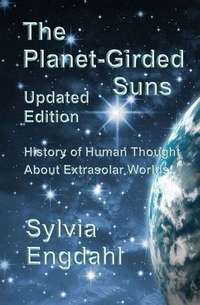
The Planet-Girded Suns
Our Forebears' Firm Belief in Inhabited Exoplanets
by Sylvia Engdahl
This book was updated and expanded in 2012 from the original 1974 edition.
Interest in extrasolar worlds is not new. From the late 17th century until the end of the 19th, almost all educated people believed that the stars are suns surrounded by inhabited planets--a belief that was expressed not in science fiction, but in serious speculation, both scientific and religious, as well as in poetry. Only during the first half of the 20th century was it thought that life-bearing exoplanets are rare.
This is not a science book--rather, it belongs to the category known as History of Ideas. First published by Atheneum in 1974, it tells the story of the rise, fall, and eventual renewal of widespread conviction that we are not alone in the universe. In this updated edition the chapters dealing with modern views have been revised to reflect the progress science has made during the past 40 years, including the actual detection of planets orbiting other stars.
More poetry from past centuries, source notes, and an extensive bibliography have been added to this edition. In addition it contains a new Afterword, "Confronting the Universe in the Twenty-First Century," discussing the relevance of past upheavals in human thought to an understanding of the hiatus in space exploration that has followed the Apollo moon landings. (A slightly modified version appears in
The Space Review, to which there is an updated version in my ebook From This Green Earth: Essays on Looking Outward and online at this website.
. . . The clear galaxy
Shorn of its hoary lustre, wonderful,
Distinct and vivid with sharp points of light,
Blaze within blaze, an unimagin’d depth
And harmony of planet-girded suns
And moon-encircled planets, wheel in wheel,
Arch’d the wan sapphire. Nay—the hum of men,
Or other things talking in unknown tongues
And notes of busy life in distant worlds
Beat like a far wave on my anxious ear.
—Alfred, Lord Tennyson, “Timbuctoo,” 1829
"So many suns, so many earths, and every one of them flock’d with so many herbs, trees and animals, and adorned with so many seas and mountains!" --
Astronomer and physicist Christian Huygens, 1698
"When I stretch my Imagination thro’ and beyond our system of planets, beyond the visible fix’d stars themselves, into that space that is every way infinite, and conceive it fill’d with suns like ours, each with a chorus of worlds for ever moving round him, then this little ball on which we move seems . . . to be almost nothing." --
Benjamin Franklin, 1728
"How immensely great. how wonderfully glorious is the structure of this universe, which contains many thousand worlds as large as ours . . . rolling like the earth round their several suns, and filled with animals, plants, and minerals, all perhaps different from ours." --
Textbook for children, 1758
From the Reviews
"In a brisk, engrossing account Engdahl traces the theories and speculations concerning the possibility of extraterrestrial intelligent life throughout history." --
ALA Booklist
"Engdahl has marshalled an impressive and fascinating selection of primary sources. . . . [She] has shown how deep this vein of speculation runs . . . and reminded us that our ancestors entertained a view of the universe that was larger and more imaginative than the history books lead us to believe. Challenging and original." --
Kirkus Reviews
"This is an important and interesting book. . . . The author's thought-provoking presentation on the subject should provide some fascinating reading." --
National Space Society, 2012
"Engdahl has created a well-crafted, well-researched and unique view on exoplanets, and is a must-read for those who want a different view on space than the usual technical one." --
Readers’ Favorites, 2012
Publication History
Atheneum (hc) - 1974
(subtitle Man's View of Oher Solar Systems)
Ad Stellae (eb & pb) - 2012 (updated;
subtitle The History of Human Thought About Extrasolar Worlds)
Ad Stellae (eb & pb) - 2016
(minor updating; subtitle The Long History of Belief in Exoplanets)
Ad Stellae (eb only) - 2021 ((Identical to 2016 edition except for new subtitle)
Ad Stellae (eb & pb) - 2022 (new preface, additions to bibliography, uniform subtitle)
Purchase the ebook edition of
The Planet-Girded Suns from
Amazon,
Amazo UK.
Barnes & Noble,
Apple Books,
Kobo,
Smashwords, or
Google Play .
Purchase the paperback edition from
Amazon. (It can be ordered from other booksellers but at a higher price due to distribution costs.)
See more quotes from reviews.
Read the Foreword to the book.
Frequently Asked Questions

Cover of 2016 edition
The word "girded" is a rather unusual one applied to suns. Why did you use it in the book's title?
The title is taken from the poem by Tennyson quoted above, which was written at a time when belief im inhabited exoplanets was common.
How different is this edition from the edition published in 1974 by Atheneum?
The chapters dealing with modern knowldge and speculation about extrasolar worlds, which were outdated, have been revised to be current as of 2012, with a few further minor changes in 2016. However, scientific knowledge of exoplanets is progressing so fast that the details won't stay current very long. This is not intended to be a science book--there are many fine science books giving much more information about what is known today. Its aim is to tell how people have felt about other worlds from century to century. The historical chapters have not changed at all, except that the non-inclusive language standard in the 1970s has been replaced, starting with "Man's" in the original subtitle, "Man's View of Other Solar Systems."
The first edition was marketed as a YA book. Were any changes needed because this one was issued as general adult nonfiiction?
Only the addition of source notes (which I was not allowed to include in the YA edition) plus a long bibliography, an appendix containing many more passages of poetry from the 17th through early 20th centuries, and the afterword described above. The original YA version was too difficult reading for most teens, yet too oversimplified for scholars despite being based on original research in primary sources. I intended at that time to write a more scholarly one for an adult audience, but by now several academic specialists in the field of History of Ideas have written excellent books on the subject, so another isn't needed. This one is suitable for adult and high school readers without much background in history or science.

Cover of 2016 edition
The edition published in 2012 was subtitled "History of Human Thought About Extrasolar Worlds." Why did you change the subtitle again in 2016, and yet again n 2021?
I changed the subtitle in 2016 to make it look little less academic, and to make the book come up in searches for the now-popular topic "exoplanets." It hasn't done much good, since most people searching for exoplanets are looking for science books and most people interested in history aren't aware that there is any history concerning past views of exoplanets. So with the 2021 change, to the ebook edition (which weren't made until 2022 in the paperbck edition because changing the subtitle required reissuing it under a different ISBN) I'm hoping to indicate more clearly what it's about. Like my novels, it doesn't fit neatly into any category. And unfortunately, the way Amazon's categories are structured, it's mixed in with books about UFOs.
Doesn't it include information about historical sightings of what are now called UFOs?
Absolutely not! Until the twentieth century the possibilty of interstellar travel did not occur to anyone. Though most educated people believed the planets of other suns are inhabited by beings more advanced than ourselves--in some cases by angels--they assumed no contact between planets could ever exist. (There was a little fantasy about trips to the moon, but this book covers only ideas about other solar systems.) If any past events now alleged to involve "ancient astronauts" were noticed, they weren't associated in people's minds with physical space travel. But since humans naturally long for some form of contact with worlds they believe exist, it was common for them to expect that they would see them after death. Poetry describing spiritual tours of other worlds on the way to Heaven was extremely popular.
From the time I began researching this book in the 1970s, everyone to whom I mentioned my project jumped to the conclusion that it had something to do with past alien contact. They would say, "Oh, you mean like the book
Chariots of the Gods?" This was very irritating to me because books about aliens are often sensational and even when they're not, they are classed as "fringe" material and are not taken seriously by historians. In bookstores they are usually shelved with metaphysics rather than with history or religion. So it's a big handicap to the promotion of a book; I could never gotten the original edition published if it hadn't been issued as YA nonfiction, which for marketing purposes is not categorized by subject.

Cover of 2012 edition
Do you think there could have been past alien visitations that led people to believe in ET life, even if they weren't specifically aware of them?
There is no evidence of any alien visitations acceptable to accredited archeologists, and personally, as readers of my novels know, I believe advanced extraterrestrials would be careful not to influence young civilizations they observed. As to whether there have ever actually been alien observers, we have no way of knowing, and in my opinion any such past contact will not be revealed until long after we ourselves have developed starships. In any case, past centuries' conceptions of other planets' inhabitants were very different from those common today and the idea of travelers from other worlds would not have occurred to people--strange visitors would have been assumed to be supernatural beings. (For more about my view of UFOs, see
The Significance of Belief in UFOs at this website.)



